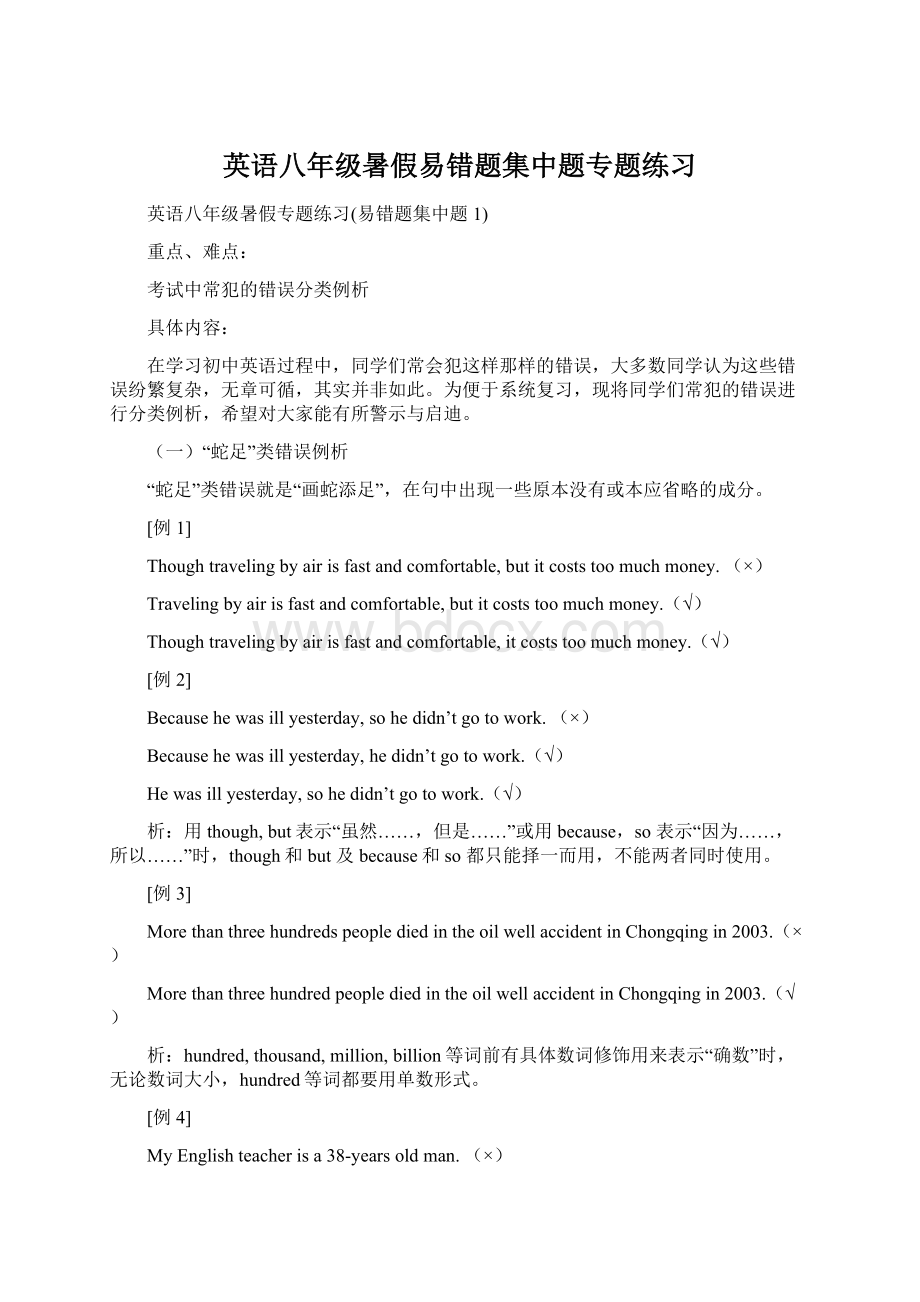英语八年级暑假易错题集中题专题练习.docx
《英语八年级暑假易错题集中题专题练习.docx》由会员分享,可在线阅读,更多相关《英语八年级暑假易错题集中题专题练习.docx(11页珍藏版)》请在冰豆网上搜索。

英语八年级暑假易错题集中题专题练习
英语八年级暑假专题练习(易错题集中题1)
重点、难点:
考试中常犯的错误分类例析
具体内容:
在学习初中英语过程中,同学们常会犯这样那样的错误,大多数同学认为这些错误纷繁复杂,无章可循,其实并非如此。
为便于系统复习,现将同学们常犯的错误进行分类例析,希望对大家能有所警示与启迪。
(一)“蛇足”类错误例析
“蛇足”类错误就是“画蛇添足”,在句中出现一些原本没有或本应省略的成分。
[例1]
Thoughtravelingbyairisfastandcomfortable,butitcoststoomuchmoney.(×)
Travelingbyairisfastandcomfortable,butitcoststoomuchmoney.(√)
Thoughtravelingbyairisfastandcomfortable,itcoststoomuchmoney.(√)
[例2]
Becausehewasillyesterday,sohedidn’tgotowork.(×)
Becausehewasillyesterday,hedidn’tgotowork.(√)
Hewasillyesterday,sohedidn’tgotowork.(√)
析:
用though,but表示“虽然……,但是……”或用because,so表示“因为……,所以……”时,though和but及because和so都只能择一而用,不能两者同时使用。
[例3]
MorethanthreehundredspeoplediedintheoilwellaccidentinChongqingin2003.(×)
MorethanthreehundredpeoplediedintheoilwellaccidentinChongqingin2003.(√)
析:
hundred,thousand,million,billion等词前有具体数词修饰用来表示“确数”时,无论数词大小,hundred等词都要用单数形式。
[例4]
MyEnglishteacherisa38-yearsoldman.(×)
MyEnglishteacherisa38-year-oldman.(√)
析:
句中的38-years-old是由数词、名词和形容词一起构成的复合形容词,在句中充当定语,修饰名词man。
复合形容词作定语时,其中的名词要用单数形式,且各词之间要有连字符“-”。
[例5]
TheSmithshavemovedBeijing.(×)
TheSmithshavemovedtoBeijing.(√)
析:
不及物动词后接名词或代词作宾语时,要在动词之后加上适当的介词;但不及物动词后接home,here,there等副词作宾语时,动词之后不必加任何介词。
[例6]
Theboxistooheavyforhimtocarryit.(×)
Theboxistooheavyforhimtocarry.(√)
析:
不定式tocarry及其逻辑主语forhim共同组成不定式复合结构作状语一起修饰heavy。
(二)“主谓不一致”类错误例析
主谓不一致类错误指的是句子的主语和谓语动词在人称和数上不一致而形成的错误。
[例1]
Eachoftheboyshaveapen.(×)
Eachoftheboyshasapen.(√)
Theboyseachhaveapen.(√)
析:
复数名词前有表个体的eachof,oneof,every,eitherof等词组修饰,或有表否定的neitherof,noneof等词组修饰时,谓语动词要用单数形式。
[例2]
NeitherhenoryouisgoodatEnglish.(×)
NeitherhenoryouaregoodatEnglish.(√)
析:
either...or...,neither...nor...,notonly...,butalso...等词组连接句子的两个主语时,谓语动词遵循“就近一致原则”,即由靠近谓语的那个主语决定谓语的人称和数用何种形式。
[例3]
Twomonthsarequitealongtime.(×)
Twomonthsisquitealongtime.(√)
析:
当时间、度量、距离、重量等名词作句子主语时,常将其看作一个整体,谓语动词要用单数形式。
[例4]
Tenminusthreeareseven.(×)
Tenminusthreeisseven.(√)
析:
用英语表示加(plus)、减(minus)等数学运算时,谓语动词也用单数形式。
[例5]
WatchingTVtoomucharebadforyoureyes.(×)
WatchingTVtoomuchisbadforyoureyes.(√)
析:
不定式、v-ing形式充当句子主语时,谓语动词用单数形式。
[例6]
Thenumberoftheworkersinthisfactoryareabout5,000.(×)
Thenumberoftheworkersinthisfactoryisabout5,000.(√)
析:
thenumberof表示“……的数量”,谓语动词用单数形式;anumberof的意思是“若干”或“许多”,相当于some或alotof,和复数名词连用,谓语动词用复数形式。
(三)“词序”、“语序”类错误例析
词序、语序类错误指的是单词或句子在排列顺序上不正确,也表现为该用陈述语序的用了疑问句语序,或该用疑问句语序的用了陈述句语序等情况。
[例1]
Hello!
Ihaveimportantsomethingtotellyou.(×)
Hello!
Ihavesomethingimportanttotellyou. (√)
析:
形容词或动词不定式修饰不定代词作定语时,修饰成分要置于不定代词之后。
[例2]
Hissonisenougholdtogotoschool.(×)
Hissonisoldenoughtogotoschool.(√)
析:
enough作形容词修饰名词时,可以放在名词前,也可放在名词后;作副词修饰形容词或副词时,只能放在形容词或副词之后。
[例3]
Hereisyoursweater,putawayit.(×)
Hereisyoursweater,putitaway.(√)
析:
putaway,pickup,puton等“动词+副词”构成的词组后接代词作宾语时,代词只能放在动词和副词之间。
[例4]
Idon’tknowwhereishegoing.(×)
Idon’tknowwhereheisgoing.(√)
析:
在含宾语从句的复合句中,从句要用陈述句语序。
[例5]
Look!
Herethebuscomes.(×)
Look!
Herecomesthebus.(√)
析:
在以here,there引起的陈述句中,若句子的主语是名词,要用倒装语序,即用“Here/There+动词+名词”结构;但主语若是代词时,则不用倒装语序,即用“Here/There+代词+动词”结构。
[例6]
Idowellinplayingfootball,_______.(我妹妹也行。
)
A.somysisterdoes(×)
B.sodoesmysister(√)
[例7]—LiLeiisreallyafootballfan.
—_______.(确实这样.)
A.Soishe(×)
B.Soheis(√)
析:
“so+be动词/助动词+主语”的倒装结构表示前面所述情况也适用于后者,意为“……也是这样”;“so+主语+be动词/助动词”的陈述结构表示对前述情况的肯定,意为”……确实如此”。
(四)“逻辑”类错误例析
逻辑类错误是指用英语表达某一思想时,犯了逻辑推理错误,导致句子语法成分不全,句意表达上前后矛盾等方面的失误。
[例1]
重庆比中国的其他城市都大。
ChongqingislargerthananycityinChina.(×)
ChongqingislargerthananyothercityinChina.(√)
析:
“anycityinChina”包括了重庆这座城市,同一事物自己与自己不能做比较,只有在city前加上other才能表示重庆和中国的其它城市比较大小。
英语八年级暑假专题练习(易错题集中题2)
例2
广州的天气比北京的天气更暖和。
TheweatherinGuangzhouiswarmerthanBeijing.(×)
TheweatherinGuangzhouiswarmerthanthatinBeijing.(√)
析:
表示比较时,句子中的两个比较对象必须一致,不同的比较对象不能做比较。
错误句的比较对象分别为theweatherinGuangzhou和Beijing,这两个不同类的事物之间不能做比较。
(五)“受汉语思维方式影响”类错误例析
受汉语影响类错误是指用英语表达某个意思时,受了汉语表达的影响而导致犯错。
[例1]
Mr.WuteachesourEnglish.(×)
Mr.WuteachesusEnglish.(√)
析:
“teachsb.sth.”句式中的sb.和sth.是teach的双宾语,因此teach后的人称代词要用宾格,而不能受汉语影响使用形容词性物主代词。
[例2]
Hissistermarriedwithateacherlastsummer.(×)
Hissistermarriedateacherlastsummer.(√)
析:
表达“A和B结婚”,要用Amarried/willmarry B。
这时务必要避免受汉语影响使用Amarried/willmarrywithB。
[例3]
Thereisgoingtohaveafilmtonight.(×)
Thereisgoingtobeafilmtonight.(√)
析:
一般将来时用在Therebe句式中时,begoingto或will之后的动词原形只能用be,也就是说要用Thereis(are)goingtobe..../Therewillbe....。
[例4]
I’llgohikingifitwon’trainnextSunday.(×)
I’llgohikingifitdoesn’trainnextSunday.(√)
析:
习惯上在含有时间状语从句和条件状语从句的复合句中,如果主句的谓语动词用了一般将来时,从句的谓语动词要用一般现在时表示将来的动作。
[例5]
Teachertoldusyesterdaythattheearthwentaroundthesun. (×)
Teachertoldusyesterdaythattheearthgoesaroundthesun. (√)
析:
习惯上在含有宾语从句的复合句中,主句的谓语动词用了一般过去时,从句的谓语动词要用过去的某种时态。
但如果从句表述的是一客观事实或客观真理时,则不受主句时态的影响,而用一般现在时。
[例6]
Alltheballsarenotround.翻译成汉语:
所有的球都不是圆的。
(×)
并不是所有的球都是圆的。
(√)
析:
all,every,both等词和not连用时,not通常放在all,every,both的后面,一般情况下表示部分否定,意为“并非……都……”。
[例7]
Doyouknowthewayofthepark?
(×)
Doyouknowthewaytothepark?
(√)
析:
习惯上表示无生命名词的所有格常用“……of……”;但表示“通往……的路”要用“thewayto...”,而不能用“thewayof...”。
类似结构的词还有thekeytothelock(这把锁的钥匙),theanswertothisquestion(这个问题的答案),thetickettotheconcert(音乐会的票)等。
[例8]
—Hedidn’tgotoschoolyesterday,didhe?
—_______,thoughhedidn’tfeelverywell.
A.No,hedidn’t(×) B.Yes,hedid(√)
[例9]
—Don’tyouusuallycometoschoolbybike?
—_______.ButIsometimeswalk.
A.No,Idon’t(×) B.Yes,Ido(√)
析:
习惯上英语中的yes意为“是的”,no意为“不”,但在“前否后肯”的反意疑问句或否定疑问句中,yes意为“不”,no意为“是的”。
【模拟试题】
一.阅读理解:
(A)
Thereisaone-dayholidayinmostcountriesonNewYear’sEve.ThereareseveralinterestingcustomsintheWest,andtherearemanydifferencesfromcountrytocountry.
ThoughChristmasisafamilyget-together.NewYearforsomeisatimetobewithfriendstoo.PartiesaremostoftenheldtowelcomeNewYear.Atsucharties,thereisfoodanddrinkanddancinguntilthetimenearsforthecomingofNewYear.
Atmidnight,peopleoftensay“HappyNewYear”toeachother.Champagne(香槟酒)isafavoritedrinkforNewYear.Inmanywesterncountriesfireworks(烟火)areletoffatmidnight,andmanypeopleliketomakeanoise,possiblytodriveawaybadspirits(幽灵).
OneimportantsongisoftensungatNewyear—theScottish(苏格兰)songofAuldLangsyne(goodtimeslongago.)
1.PeopleusuallyhavegreatcelebrationsforNewYearon .
A.NewYear’sDay B.thenightbeforeNewYear’sEve
C.thenightofNewYear’sDay D.thenightbeforeNewYear’sDay
2.IntheWest,NewYearisalsoatimewhen. .
A.friendsgettogether B.friendswritetoeachother
C.peoplecanhaveaweek’sholiday D.peoplecanfromcountrytocountry
3.Theword“customs”inthepassagemeans .
A.习俗 B.聚会 C.饮食 D.活动
4.AtmidnightonNewYear’sEvewesternpeopleoften .
①holdpartiestowelcomeNewYear ②makeanoisetodriveawaybadspirits
③drinkwithfriendsorfamilies ④say“HappyNewYear”toeachother
⑤singanimportantFrenchsong ⑥letofffireworks
A.①②③④ B.③④⑤⑥ C.②③④⑥ D.①②⑤⑥
5.Thispassagemainlytalksabout .
A.westernpeopledrinktogetheronNewYear’sEve
B.whatwesternpeopledoonNewYear’sDay
C.howwesternpeoplespendtheirNewYear’sEve
D.westernpeoplehaveagoodtimeonNewYear’sDay
(B)
PeoplehaveflownkitesinJapanformorethan1,000years.Therearedifferentkindsofkitesthere.Somelooklikebats(蝙蝠);otherslooklikebirds.Mosthavepicturesonthem.
TherearemanyinterestingstoriesaboutkitesinJapan.Onestorytellsaboutathief(小偷)whousedakite.Hewantedtosteal(偷)thegold(金子)fromthetopofahightower(塔).Thethiefandhisfriendsmadealargekite.Onedarkwindynighthecaughtholdofthekite.Hisfriendsraised(使升高)itintotheair.Thentheymovedthekitenearthetopofthetower.Thethiefwasabletostealthegold.Anotherstorytellsaboutafatherandason.TheywereintroubleonanislandnearJapan.Thefathermadealargekite.HissonflewinitbacktoJapan.
TheyoungmenofJapanhavekitematches.Whenthekitesareflying,thematchstarts.Theyoungmentrytobreakeachother’skitestrings(细绳).Thelastkiteleftintheskyisthewinner.
1.MostkitesinJapan .
A.areverylarge B.areverysmall
C.looklikebats D.looknicewithpictures
2.Inthekitematchtheyoungmentryto .
A.maketheirkitesflyhigh
B.stopeachother’skitesfromflyinginthesky
C.makeverylargekitesthemselves
D.drawbeautifulpicturesontheirkites
3.Thefatherinthepassagemadealargekitetohelphissonto .
A.returnhome B.flyovertheisland C.flyoverthesea D.stealgold
4.Thepassagemainly(主要的)tellsus .
A.howtoflykites
B.howakitematchstarts
C.somethingaboutthekitesinJapan
D.whatthekiteslooklike
二.综合填空:
Dogsaregoodpets(宠物).Theyareveryf1topeopleandverybeautiful,too.Mostdogsgetonverywellwithc2andtheirparents.Othersaregoodwatch-dogsbecausetheycryloudlywhenas3personarrives.Whenyoubuyadog,animportantthingtothinkaboutisitss4-buyasmalldogifyourhomeissmallandabigg